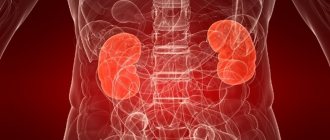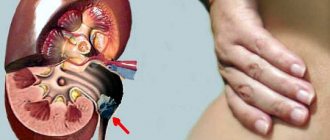Nocturia is a condition in which urine produced at night exceeds the amount of urine a person produces during the day. Naturally, this state is rather conditional.
For example, representatives of some professions work at night, and during the day they are forced to sleep and rest. In this case, nocturia for such people will be a condition in which the urine excreted during sleep or rest will exceed the amount of urine excreted by the body during active wakefulness.
You can recall the well-known term “diuresis”. The concept of daily diuresis includes the total volume of urine excreted by a person per day. So, nocturia will be a condition in which a significant part of the daily volume of urine will occur during the period of sleep and rest.
Nocturia is not a disease, but merely reflects one of the symptoms that can occur with a large number of different diseases. To put it very simply, this is the name for frequent night urination, when a person wakes up several times during the night due to a “minor need.”
Reasons for development
The following reasons provoke the development of nocturia:
- General polyuria is an increase in urine emitted per day, caused by diseases caused by neuro-endocrine changes and processes in the kidneys.
- Nocturnal polyuria is a large volume of urine at night.
- Changes in the urinary organ that reduce its ability to hold urine.
The primary cause of nocturnal polyuria is considered to be the consumption of excess fluid before bedtime .
In men, the reason for regular urination at night is inflammation of the prostate gland: compression of the urinary canal occurs, causing the bladder to partially empty. The remaining urine eventually increases reflex urination at night.
The disease often progresses in women in the last trimester of pregnancy due to pressure from the enlarged uterus on the bladder.
The main factors for the occurrence of the disease in children can be:
- Underdevelopment of the bladder, parasympathetic nervous system, as a result of which urine excretion occurs at the level of a reflex. Until two years old, the baby is only trying to regulate urinary function, so this process is often uncontrollable due to sound sleep.
- Cool air in the room (the kidneys have to work hard, and night urination occurs).
- Stress in children triggers involuntary excretory activity, resulting in “unscheduled” emptying of the bladder.
In addition to the above reasons, which are generally safe for the child’s health, frequent nocturnal diuresis also occurs due to serious factors. For example, it can be provoked by inflammatory processes, the development of diabetes mellitus in childhood, congenital kidney abnormalities or heart defects.
Types of polyuria
The pathological process called polyuria (nocturia) can be classified according to several criteria. So, regarding the duration of the process, polyuria can be:
- Temporary. Characterized by a short duration within one night or a certain period. It can be triggered by infection, pregnancy, or simply excessive drinking.
- Constant. It is relatively constant and in most cases develops against the background of kidney diseases.
Regarding the cause of development, polyuria can be classified into the following groups:
- Pathological. It develops as a secondary process against the background of other chronic diseases. Often formed against the background of diabetes or heart failure.
- Physiological. Develops after drinking large amounts of liquid or using diuretics.
Accompanying symptoms
The development of nocturia in the body can be assumed when the number of diuresis during sleep is two or more times.
But you need to distinguish it from the possible habit of going to the toilet at night and immediately before waking up. It is also important to pay attention to the amount of liquid he drinks per day. If this figure is more than 2 liters, then the body’s response will be an increase in the number of urinations at night.
Symptoms of bladder release include:
- A very long delay in the onset of urination.
- Discharge of urine in a thin stream, sometimes drop by drop.
- Feeling of incomplete emptying.
- Urinary incontinence during the day.
Female nocturia manifests itself:
- The manifestation of cystitis in women occurs in the form of a frequent urge to urinate, urinary incontinence, and cutting pain when the urinary organ is full.
- Complications of the urinary system, accompanied by pain in the groin area. The main indicator of the development of pathology is the feeling of incomplete urination during and after physiological action.
- In the chronic form of pyelonephritis, it is expressed by fever and aching lumbar pain.
- Edema in body tissues in diseases of a cardiovascular nature.
If the patient has the following conditions:
- Daily weight fluctuations.
- Unquenchable thirst.
- Pain and feeling of heaviness in the lumbar area.
- Obvious swelling is a reason to check for diseases characterized by nocturia.
Diet and prevention
- When nocturia occurs, you need to take care of a balanced diet.
- It is important to give up salt or try to reduce the amount of salt you consume.
- It is recommended to fill your diet with fresh plant foods and drink juices that you make yourself.
- To prevent the development of nocturia, it is necessary to limit the consumption of water, coffee drinks, tea and alcohol in the evening.
- Timely solutions to problems of the genitourinary and cardiovascular systems will help prevent nighttime urges and more serious disorders.
- Moderate physical activity is an important measure to prevent any urinary pathologies.
Diagnostics
Depending on the etiological factor, nocturia is classified as cardiac, which develops against the background of low contractile function of the heart muscle, and renal , caused by renal pathologies.
Nocturia develops in numerous types of diseases:
- Heart failure - due to blood stagnation in the veins and daytime fluid retention in the body. In such cases, nocturia saves the body from the effects of daytime oliguria. The heart cannot fully cope with the load during the day, blood circulation in the kidneys is delayed and the process of urine formation slows down. In this situation, the disease is characterized by edema, attacks of suffocation, dilation of the neck veins, and moist rales in the lungs.
- Diseases of the urinary system - occurs as a result of swelling of the renal vessels, leading to an increase in blood flow at night.
- Inflammatory processes of the thyroid gland.
- liver cirrhosis - as a consequence of arterial hypertension.
- Secondary amyloid nephrosis , which appears due to protein metabolism disorders, can also provoke nocturia
- Prostate adenoma - due to obstructed urine outflow, from which urine returns to the bladder when the prostate gland enlarges.
- The development of diabetes is accompanied by an increase in urine output during the day, depending on the volume of fluid drunk due to excessive thirst, which characterizes diabetes.
- Atherosclerosis of the renal arteries in the elderly population.
How does it manifest?
When a person has a history of internal diseases, signs of nocturia will occur in conjunction with other symptoms.
If we consider nocturia as a separate condition, then the following symptoms will be present:
- Night trips to the toilet more than 1 - 2 times.
- Sleep disturbance.
- Anxious dream.
- Increased fatigue.
- Absent-mindedness.
- Irritability.
All of the above symptoms mainly appear against the background of regular disruption of night sleep, which disrupts nocturnal diuresis. Signs of nocturia in women, less often in men, are swelling of the face, upper and lower extremities. Patients complain of surges in blood pressure and heart rhythm disturbances.
Before treating frequent nocturnal diuresis, it is important to determine the causes of this condition, since the prognosis for further recovery will depend on the quality of therapy. Symptoms of nocturia are a complex of disorders of the kidneys and urinary system, so it is important to listen to your body and do not hesitate to visit a doctor at the first signs of illness.
Treatment
To cure any disease is to eliminate the causes of its occurrence. In order to identify signs of nocturia, a Zimnitsky kidney test is provided, which consists of collecting 8 doses of daily urine every three hours for a thorough analysis of the volume and specific gravity of an individual portion. The level of urine excreted at night, as a rule, should not exceed the daily norm, and it should be more concentrated.
The patient is offered the following:
- Drug therapy.
- Refusal to drink an abnormal amount of liquid before going to bed.
- Balanced diet.
The patient should also undergo a biochemical blood test to identify the cause of inflammation. If a patient is suspected of having diabetes, their blood is taken to determine their sugar level. In case of pain or discomfort in the kidneys, it is recommended to conduct an ultrasound examination and radiography.
First of all, it is necessary to recover from the disease, the symptom of which was nocturia. The method of treatment prescribed depends on its type.
If pathologies inherent in the genesis of the heart and blood vessels are identified, then a cardiologist is involved in the healing process.
If there are problems with the full functioning of the heart or blood vessels, it is possible to involve surgeons. X-rays may be required for atherosclerosis in the arteries of the kidneys.
When treating nocturia in the stronger sex, manifested by adenomatous prostate disease, surgery may also be necessary. In modern medicine there are many treatment methods to get rid of tumor formations in the prostate. You will have to get to the required area through the urethra. These methods allow you to cure patients and achieve good results in a short period of time.
Drug therapy against nocturia is selected individually for each person:
- To improve the movement of the circulatory system - “Pentoxifylline”
- Nootropic drugs, for stable loads - Piracetam.
- Tablets for inflammation, pain and fever - Diclofenac, Ibuprofen, Indomethacin.
- Psychotropic drugs for the treatment of depression - Sertraline, Tianeptine, Fluoxetine, Citalopram
- Medicines that stabilize the functioning of the urethral canal and urinary organ - Oxybutynin, Tolterodine, Solifenacin
- For the prevention of inflammatory diseases of the genitourinary tract - "Ovestin"
Taking such drugs will allow patients to keep the heart and vascular systems in good shape and normalize nervous activity. It is very useful to include millet porridge, vegetables, fruits and decoctions of medicinal plants in your diet. In addition, you should try to stimulate the points that control the urinary process.
Mustard plasters applied for 10 minutes before going to bed will have a miraculous effect, and during the day it is better to wear a patch with pepper. Glue them to the area of the sacrum or pubis. Protecting yourself from the occurrence of an unwanted disease will not take much effort. Just follow a few tips:
- The last glass of any liquid should be taken four hours before bedtime.
- Hypothermia should be avoided because it will adversely affect the normal functioning of the kidneys and urinary system.
How to recognize the disease?
If you experience frequent urination at night, you should not hesitate to visit a urologist or nephrologist, since such a symptom may be the first signal of the development of any disease. The initial consultation with a doctor will include taking a medical history, prescribing laboratory tests and instrumental diagnostics.
- general urine analysis;
- bacteriological urine culture;
- Ultrasound examination of the kidneys and pelvic organs.
An informative research method is urine analysis according to Zimnitsky, which allows you to determine the daily volume of urine. When conducting such an analysis, it is prohibited to consume diuretics, as well as foods that increase thirst. If other diseases are suspected, diagnosis includes consultation with a cardiologist, nephrologist, and additional diagnostic methods.
Preventive measures
To avoid the possibility of encountering polyuria, you need to take care of your health from the very beginning. Namely:
- Lead a healthy and active lifestyle;
- Eat properly without overusing foods high in salt and seasonings;
- Avoid excessive consumption of marinades and smoking;
- Do not take alcohol or drugs;
- Treat all chronic diseases in a timely manner or at least keep them under control;
- Avoid diuretic products (coffee, chocolate);
- Maintain a normal drinking regime (at least 1.5 liters of water per day).
Remember: preventative measures will allow you to stay healthy without unnecessary medical intervention and lengthy medical procedures.
Clinical picture of the pathology
Polyuria is characterized by one single symptom - frequent urination (especially at night) with large single portions of urine. It is worth knowing that in an uncomplicated form of the pathology the volume of urine reaches two liters, and in a complicated form or during pregnancy it can reach three liters. If the cause of polyuria is diabetes, then the volume can reach 10 liters of urine per day.
Otherwise, the clinical picture of the pathology is most often the symptoms of the disease that became the root cause of the increase in urine volume. That is, it is against the background of the existing symptoms that the attending physician will make an accurate diagnosis.










